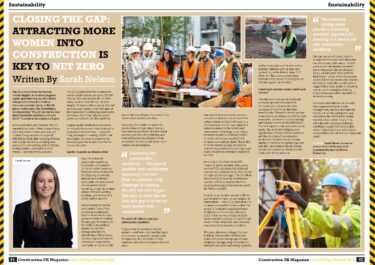Recent Release | 12 Dec 2022
Crisis resilience of the construction industry

Economic Consulting Team
Oxford Economics

Despite the Covid-19 pandemic, the German construction industry developed positively in 2020 and 2021 supporting the overall economy during the crisis. The study took this as an opportunity to take a closer look at the extent and determinants of the crisis resilience of the German construction industry in various crises and a European comparison.
The construction industry is often seen as a pillar of macroeconomic development during economic crises. Against this background, the question arises of how resilient the German construction industry has been in the wake of the Covid-19 pandemic. Using current data, the study aimed at analysing the consequences of past economic crises and which factors and instruments can enhance the resilience of construction companies in coping with past and future crises.
Although each crisis is unique and requires different responses, there are certainly “universal” factors that improve the crisis resilience of companies. These include the strategic safeguarding of liquidity, the management and control of key operating figures, the reduction of structural dependencies through diversification – including customer segments, sales markets, financiers, and suppliers – strategic relationship and reputation management and access to external advice. We also recommend that construction companies adapt early to trends that harbour crisis potential. Particularly concerning the potential risk of climate change and digitalisation, the findings indicate that the construction industry still has some catching up to do.
At the sector level, our empirical findings also indicated that diversifying markets was an effective means of increasing the sector’s resilience. In contrast, a high share of large, young, and potentially less-solvent firms reduced the sector’s resilience. In addition, the sector’s availability of skilled labour played a crucial role: a high share of vacant positions and a higher share of workers with a higher education level tended to reduce resilience by reducing a company’s flexibility in responding to a crisis. Furthermore, factors that cannot be influenced by the companies themselves played a central role. Factors indicating an overheating and the formation of housing bubbles in the construction and real estate industry tended to reduce the overall resilience of the industry.
About the team
Our Economic Consulting team are world leaders in quantitative economic analysis, working with clients around the globe and across sectors to build models, forecast markets and evaluate interventions using state-of-the art techniques. Lead consultants on this project were:

Johanna Neuhoff
Associate Director of Economic Consulting, Continental Europe

Hannah Marie Zick
Economist, Economic Impact
You might be interested in

Weakness in construction and its related sectors show the impact of interest rate hikes
Ever since the onset of advanced economies’ campaign of interest rate hikes in December 2021 there has been a lively debate about the impact and efficacy of tighter monetary policy in terms of reducing inflation and slowing growth. While inflation has indeed fallen across the world, the relative economic resilience in the United States in particular, which has raised interest rates significantly more than the eurozone, has raised questions about if and how much interest rates are actually depressing activity.
Find Out More
Chartbook: Global Construction Outlook Q3 2023
Global construction activity is now forecast to fall 1.6% in 2023 and rebound 0.5% in 2024 to $9.6tn. China’s real estate downturn continues to dominate the global outlook. We now expect a slower recovery in both residential and non-residential building activity – and anticipate a more muted recovery in Chinese GDP over the medium term.
Find Out More
Chartbook: Global Construction Outlook Q4 2023
We have downgraded our outlook and now forecast global construction activity to fall 0.3% in 2024 to US$9.6tn and rebound 2.4% in 2025 to $9.8tn. This downgrade is largely attributed to historical data revisions made by China’s National Bureau of Statistics which saw a higher level of activity in 2023
Find Out More
Closing the Gap: Attracting more women into construction is key to Net Zero.
Senior Economist Sarah Nelson expands on why women hold the key to achieving the all-important net zero target in the construction sector in Construction UK Magazine – End Of Year Review Edition 2023.
Find Out More